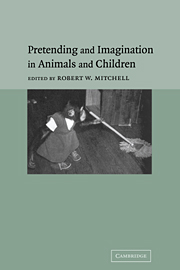Book contents
- Frontmatter
- Contents
- List of contributors
- Foreword by Sue Taylor Parker
- Preface and acknowledgments
- I Historical, developmental, and comparative overviews
- 1 Imaginative animals, pretending children
- 2 A history of pretense in animals and children
- 3 Pretending as representation: a developmental and comparative view
- II Pretense and imagination in children
- III Pretense and imagination in primates
- IV Prospects
- References
- Author Index
- Subject Index
2 - A history of pretense in animals and children
Published online by Cambridge University Press: 13 August 2009
- Frontmatter
- Contents
- List of contributors
- Foreword by Sue Taylor Parker
- Preface and acknowledgments
- I Historical, developmental, and comparative overviews
- 1 Imaginative animals, pretending children
- 2 A history of pretense in animals and children
- 3 Pretending as representation: a developmental and comparative view
- II Pretense and imagination in children
- III Pretense and imagination in primates
- IV Prospects
- References
- Author Index
- Subject Index
Summary
Interest in animal behavior suggestive of pretense and imagination followed directly from Darwinian ideas about the evolutionary relationship between humans and other animals. This chapter presents a history of ideas about, and evidence of, animal and childhood pretense. After describing the scientific climate about animal pretense prior to Groos' (1898) The play of animals, I present Groos' ideas and the scientific response. I then articulate ideas about pretense from three approaches: developmental psychology; its evolutionary offshoot in ape–human comparison; and ethology.
Evolutionary implications
Given the desire which Darwin's (1859/1902; 1871/1896) theory of natural selection produced by the late 1800s to see humanity in animals' activities, it is not surprising that, from the fact of simulation, a knowledgeable “pretense” was at times inferred. Both animals' and children's play exhibit “simulated actions in place of real actions” (Spencer, 1878, p. 630), a “dramatizing” of unsatisfied instincts or adult activities (Spencer, 1878, pp. 630–1), or “imitations of purposive voluntary acts” (Wundt, 1884/1907, p. 357).
Much as it does today, pretending included obvious simulation of the organism's own functional behavior (“self-simulations” such as feigning sleep, fighting, or retrieval; teasing; deception), responding to nothing as if something (imaginary objects), and treating one object as if another (object substitution). Feigning (Hornaday, 1879; Romanes, 1889/1975) and “pretending” (Darwin, 1871/1896, p. 69; Wundt, 1884/1907, pp. 358) described the inhibited fighting and biting of playfighting ants, dogs, and orangutans, as well as instincts enacted out of context (James, 1890).
- Type
- Chapter
- Information
- Pretending and Imagination in Animals and Children , pp. 23 - 42Publisher: Cambridge University PressPrint publication year: 2002
- 2
- Cited by



